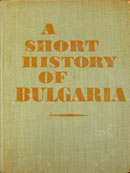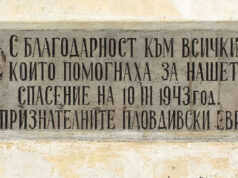 Recently while browsing I came across an interesting volume of Bulgarian history. We have already looked at histories of various types in these pages, from Crampton’s broadly academic Concise History of Bulgaria to Randall Baker’s personal memoir, Summer in the Balkans: Laughter and Tears after Communism. This month we add our first communist era selection to the list.
Recently while browsing I came across an interesting volume of Bulgarian history. We have already looked at histories of various types in these pages, from Crampton’s broadly academic Concise History of Bulgaria to Randall Baker’s personal memoir, Summer in the Balkans: Laughter and Tears after Communism. This month we add our first communist era selection to the list.
A Short History of Bulgaria, by professors D. Kossev, H. Hristov and D. Angelov, was published in 1963 by the foreign language press of the Georgi Dimitrov State Printing House. Without even cracking the cover, I can hardly think of a more convincing provenance to support its communist credentials.
The book begins with the obligatory review of activities on today’s Bulgarian territory before the arrival of the Bulgars, including many illustrations to show the high level of cultural development in pre-Bulgarian times. Then they march efficiently through the centuries discussing the rise and flourishing of the First Bulgarian Kingdom, the decline of the Kingdom and its fall under Byzantine rule, the Second Bulgarian Kingdom and Bulgaria under Turkish rule. All of these chapters describe elements of feudal society, internal and external struggle and cultural development.
Next the authors turn their attention to the national liberation movement and the struggle for independence. They quickly and repeatedly point out how the Great Powers operated in opposition to Bulgarian interests throughout this period, declaring that through their support for the Porte, “the western governments revealed themselves as the worst enemies of the progressive national liberation movement of the subjected Balkan peoples.” (p. 165) There is certainly a good deal of truth in the accusations laid down, but in true ideological fashion the authors do a fair bit of rewriting history to suit their arguments. Catholic and Protestant Missionaries, for instance, who through their written reports are widely credited with fueling fires of western support for the Bulgarian people, are labeled as pawns used by the western powers “to divide the Bulgarian people” and “to detach the Bulgarian people from Russia’s influence.” (p. 170) Such strong assertions are not supported by the facts.
The second half of the book offers a socialist interpretation of the early years of independence, the beginning of the twentieth century, the partisan struggles of the interwar years, the wresting of control by communist forces at the end of World War II, and a final triumphal look at the victorious socialist state.
The word “bourgeois” is a favorite communist pejorative term, and the authors sprinkle it liberally throughout the text. Early political struggles in independent Bulgaria are between the Conservative Party, made up of the “wealthier” bourgeoisie, and the Liberal Party, made up of the “petty” bourgeoisie. Of course both parties are a mess. We also read about the “foreign imperialist” bourgeoisie, the “village” bourgeoisie, and the “big Bulgarian” bourgeoisie. Political opposition groups are thrown together under the label “pro-western bourgeoisie political parties.” Cultural decadence is a result of corruption by “Western European bourgeois literature.” It seems that all of the countries problems can be laid at the feet of one bourgeoisie or another.
The description of historical events leading up to the overthrow of the government in 1944 and the reshaping of the state into a socialist regime is celebrated, as one would expect, as a great triumph for the Bulgarian people. The presentation is in marked contrast to that described in the dissident authored work Bulgaria: The Making of a Satellite, and a comparison of the two would be intriguing. The rise of communism is portrayed as home-grown, with support from their great and benevolent Soviet friends.
The closing chapters offer a review of accomplishments by the socialist state, including a final salute to communist rule:
“Confident in her strength and in the strength of the Soviet Union and the entire socialist system, the People’s Republic of Bulgaria calmly looks forward to her future and boldly defends the cause of socialism and peace.” (p. 437)
[ad#Amazon Books bulgarian history, bulgaria]
A Short History of Bulgaria
By Professors D. Kossev, H. Hristov, and D. Angelov
Georgi Dimitrov State Printing House
Foreign Language Press
Sofia
1963
Contents
Chapter I. The Land of Bulgaria up to the Formation of the Slav-Bulgarian Kingdom
- The Oldest Inhabitants of Bulgaria’s Territory
- The Thracians
- Roman Rule
Chapter II. Foundation, Consolidation and Flowering of the Slav-Bulgarian Kingdom
- Slavs and Proto-Bulgarians. Formation of the Slav-Bulgarian Kingdom
- Rise and Expansion of the Slav-Bulgarian Kingdom
- Establishment of Feudal Relations
- Bulgaria’s Culture in the 7th to 9th Century
- Adoption of Christianity as the State Religion
- Creation and Spread of Slav Letters
- Territorial Expansion and Cultural Progress of Bulgaria in the Early 10th Century
Chapter III. Bulgaria’s Decline and Fall under Byzantine Rule
- The Struggle Against Feudal Oppression. Bogomilism
- Conquest of Bulgaria by Byzantium
- The Bulgarian People under Byzantine Rule
Chapter IV. The Second Bulgarian Kingdom
- Revolt of the Assenids and Liberation of Bulgaria from Byzantine Rule
- Bulgaria’s Consolidation and Expansion in the First Half of the 13th Century
- Social and Political Life in the 13th and 14th Centuries
- Internecine Dissensions. Peasant Anti-Feudal Uprising Headed by Ivailo
- Dismemberment of Bulgaria
- Fall of Bulgaria Under Ottoman Rule
- Culture of Mediaeval Bulgaria in the 13th and 14th Centuries
Chapter V. Bulgaria under Turkish Rule
- Situation of the Bulgarian People under the Rule of the Turkish Conquerors
- First Attempts at Liberation
- Decline of Feudal Turkey at the Turn of the Seventeenth Century, and Strengthening of the Liberation Movement
- Bulgarian Culture from the 15th to the Mid-18th Century
Chapter VI. National Liberation Movement of the Bulgarian People
- Social and Economic Development in Bulgaria in the Late 18th and Early 19th Century
- Beginning of the National-Liberation Movement
- The National-Liberation Movement in the Second Quarter of the 19th Century
- The Crimean War and its Repercussions on Bulgaria
- Church Autonomy. Cultural Progress on the Eve of Liberation
- The National Revolutionary Movement in the ‘60s
- Creation of the Internal Revolutionary Organization
- The Uprising of April, 1876
- The Liberation of Bulgaria
Chapter VII. Bulgaria from the Liberation to the End of the 19th Century
- The Principality of Bulgaria and Eastern Rumelia
- Social and Economic Changes and Political Struggles after the Liberation
- Union of the Principality of Bulgaria and Eastern Rumelia
- The Political Crisis of 1886-1887
- Stambolov’s Dictatorship. Government of Narodnyaks and Radoslavists
- Birth and Early Growth of the Socialist Movement
- The Peasant Movement and Birth of the Bulgarian Agrarian Union
Chapter VIII. The First Two Decades of the 20th Century
- Intensified Capitalist Development up to the Balkan Wars
- The Growing Workers’ Movement
- Second Stambolovist Regime. The Ilinden and Preobrazhene Uprisings
- Proclamation of Bulgaria’s Independence
- The Balkan Wars (1912-1913)
- Bulgaria’s Participation in the First World War
- Cultural Development from the Liberation to 1917
Chapter IX. Struggles for the Overthrow of the Bourgeoisie and Fascism
- The Revolutionary Crisis in 1918-1919
- The Agrarian Government
- The September 1923 Anti-Fascist Uprising
- Struggles against the Fascist Dictatorship
- Economic Crisis and Upsurge of the Anti-Fascist Movement (1929-1934)
- Monarcho-Fascist Dictatorship. Bulgaria’s entry into World War II
- Armed Anti-Fascist Struggle (1941-1944)
- Cultural Development from 1918-1944
Chapter X. Bulgaria Along the Road of Socialism
- The September 9th People’s Armed Uprising, 1944
- Organization and First Measures of the Fatherland Front Rule. Bulgaria’s Participation in the Anti-Nazi War
- Political Stabilization and Economic Development
- Building the Foundations of Socialism
- Accelerated Socialist Construction
- The Socialist Cultural Revolution
- Bulgaria – Land of Victorious Socialism
Index of Proper Names
Index of Place Names and Nationalities
Citation form:
Kossev, D., H. Hristov and D. Angelov. A Short History of Bulgaria, Sofia: Foreign Language Press, 1963.












